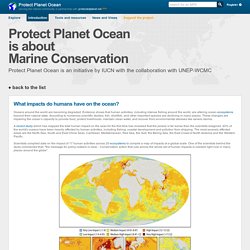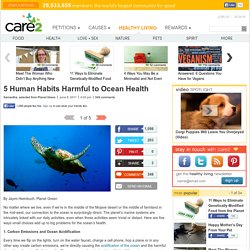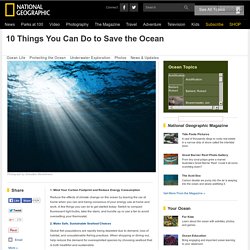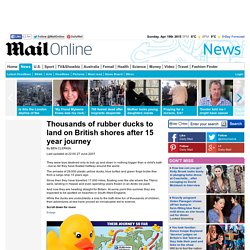

World Oceans Day is June 8th - World Oceans Day. What impacts do humans have on the ocean? What impacts do humans have on the ocean?

Oceans around the world are becoming degraded. Evidence shows that human activities, including intense fishing around the world, are altering ocean ecosystems beyond their natural state. According to numerous scientific studies, fish, shellfish, and other important species are declining in many places. These changes are impairing the ocean’s capacity to provide food, protect livelihoods, maintain clean water, and recover from environmental stresses like severe storms. A recent study which has mapped the total human impact on the seas for the first time has revealed that the picture is far worse than the scientists imagined. 40% of the world's oceans have been heavily affected by human activities, including fishing, coastal development and pollution from shipping. Scientists compiled data on the impact of 17 human activities across 20 ecosystems to compile a map of impacts at a global scale.
Go back to learn more! Threats to oceans and coasts. 5-human-habits-that-hurt-the-ocean. By Jaymi Heimbuch, Planet Green No matter where we live, even if we’re in the middle of the Mojave desert or the middle of farmland in the mid-west, our connection to the ocean is surprisingly direct.

The planet’s marine systems are intricately linked with our daily activities, even when those activities seem trivial or distant. Here are five ways small choices add up to big problems for the ocean’s health. 1. Carbon Emissions and Ocean Acidification Every time we flip on the lights, turn on the water faucet, charge a cell phone, hop a plane or in any other way create carbon emissions, we’re directly causing the acidification of the ocean and the harmful disruption of marine life that results.
Decisions like skipping an unnecessary plane ride, eating less meat, and buying green power can radically reduce your carbon footprint, and help alleviate one of the biggest threats facing our oceans. 10 Things You Can Do to Save the Ocean. 1.

Mind Your Carbon Footprint and Reduce Energy Consumption Reduce the effects of climate change on the ocean by leaving the car at home when you can and being conscious of your energy use at home and work. A few things you can do to get started today: Switch to compact fluorescent light bulbs, take the stairs, and bundle up or use a fan to avoid oversetting your thermostat. 2. Make Safe, Sustainable Seafood Choices Global fish populations are rapidly being depleted due to demand, loss of habitat, and unsustainable fishing practices. 3.
Plastics that end up as ocean debris contribute to habitat destruction and entangle and kill tens of thousands of marine animals each year. 4. Whether you enjoy diving, surfing, or relaxing on the beach, always clean up after yourself. 5. Certain products contribute to the harming of fragile coral reefs and marine populations. 6. f98u1le1.pdf. PML_TechnicalSheet_high_CO2_world.pdf. One-ocean-chapter1. One World One Ocean. The Ocean We Want To Know - Animated Parody of Gotye's Somebody That I Used To Know. Why the Ocean? Thousands of rubber ducks to land on British shores after 15 year journey. By BEN CLERKIN Last updated at 22:00 27 June 2007 They were toys destined only to bob up and down in nothing bigger than a child's bath - but so far they have floated halfway around the world.

The armada of 29,000 plastic yellow ducks, blue turtles and green frogs broke free from a cargo ship 15 years ago. Since then they have travelled 17,000 miles, floating over the site where the Titanic sank, landing in Hawaii and even spending years frozen in an Arctic ice pack. And now they are heading straight for Britain. While the ducks are undoubtedly a loss to the bath-time fun of thousands of children, their adventures at sea have proved an innvaluable aid to science. Scroll down for more The toys have helped researchers to chart the great ocean currents because when they are spotted bobbing on the waves they are much more likely to be reported to the authorities than the floats which scientists normally use.
West of England. Bill Nye The Science Guy S02E09 Ocean Currents. The World Ocean "Trashed"